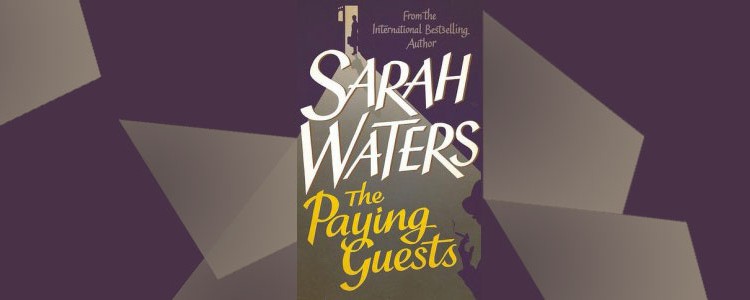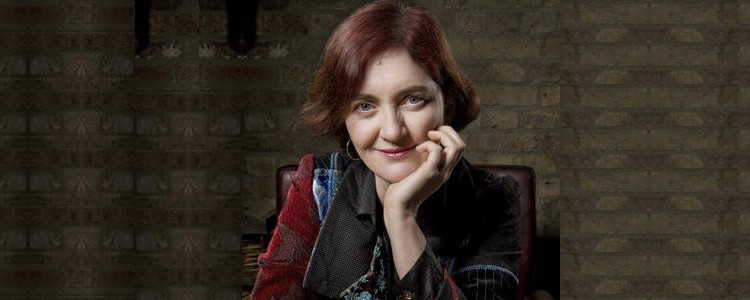Sarah Waters, “The Paying Guests”
 “…men never do want women to do the things they want to do themselves, have you noticed?”
“…men never do want women to do the things they want to do themselves, have you noticed?”
( p.80)
The Paying Guests is Sarah Water’s sixth novel. It is about a middle class family, the Wrays — a mother and daughter, Frances— who have fallen upon hard times and are forced to taken in lodgers or as they would prefer to call them “paying guests”. Mrs Wray is pained when her daughter refers to themselves now as landladies. The story is set in the inter-war years, so the Wray household like many others around them have lost their two sons in the Great War, and soon after the war, Mr Wray passed away, leaving a mountain of bad debts. Mrs Wray continues to manage her life, a pale semblance of what she was used to but her young twenty-six-year old daughter has no qualms behaving like a char woman, if required, to maintain the house and manage expenses. All though Frances had begun to recognise “the look very well–she was bored to death with it, in fact–because she had seen it many times before: on the faces of neighbours, of tradesmen, and of her mother’s friends, all of whom had got themselves through the worst war in human history yet seemed unable for some reason to cope with the sight of a well-bred woman doing the work of a char.” ( p.25) The young couple who arrive are Lilian and Leonard Barber are obviously from a different social class ( “Len said you’d think them common”), but have the means to pay the weekly rent ( “fifty-eight shillings for two weeks”). Mr Barber is described as having a “clerkly neatness of him”. Mrs Barber on the other hand is “all warm colour and curve. How well she filled her own skin! She might have been poured generously into it, like treacle.”
The story moves at a leisurely trot. There is a very slow build up to the crux of the plot– the love affair between Lilian and Frances. But once there the novelist focuses upon these two character, shutting out all other interactions and references to the outside world, save for the occasional visits by the butcher boy, fishmonger, milkman and news headlines from The Times. Then suddenly the outside world is very present in the story, with a murder, police investigation, media reports, a courtroom drama as the story develops into a murder investigation with many unexpected twists and turns.
The Paying Guests is a wandering and an exploration of women’s lives, what it means to be a lesbian in 1922 when it was barely discussed or even acknowledged openly. The empowerment of women was happening in small ways, the Suffragete movement had happened, at the Wray house such as “Nelly, Mabel, or any other live-in servant since the munitions factory had finally lured them away in 1916”, Frances’s friend Christine was living in a building run by a society offering flats to working women — all very revolutionary for a society that was emerging from the prudish and conservative shadows of Victorian England and the socio-economic devastation wreaked by World War I. In a recent interview with The Independent, Sarah Waters acknowledges paying attention to women’s secret lives and history. ( The Independent, 6 September, 2014. http://www.independent.co.uk/arts-entertainment/books/features/sarah-waters-interview-i-pay-attention-to-womens-secret-history-and-lives-9715463.html ) In the same interview, Sarah Waters admits that writing about a lesbian relationship was a conscious decision since she “missed writing about love”. This novel is a good example of historical fiction meticulously researched, another fact the author acknowledges. As the news about her new book filters through social media platforms, conversations are erupting on various platforms focused upon the well-written sex scenes that Sarah Waters is known for writing. In The Paying Guests she has apparently surpassed herself for creating scenes “electric with passion”. ( I use the word “apparently” advisedly, since this is the first book of Sarah Waters I have read.)
For period fiction written by contemporary authors to focus upon lesbian relationships, a murder mystery and engagement with the law is not new at all. Most notably Emma Donaghue’s novels especially Frog Music released earlier this year tackle similar issues raised in The Paying Guests. Ultimately it is the treatment of the story, the atmosphere created, the plot development and an understanding of the period where the writer’s strengths lie. While comparing these two novels — The Paying Guests and Frog Music — it is evident that the pace of storytelling and settings are very different, but The Paying Guests requires huge dollops of patience to read and appreciate.
Sarah Waters The Paying Guests Virago Press, London, 2014. (Distributed by Hachette India) Pb. pp. 580. Rs. 599



